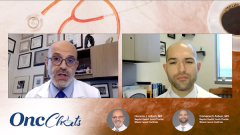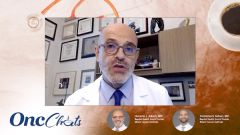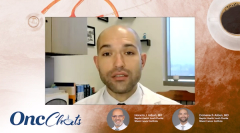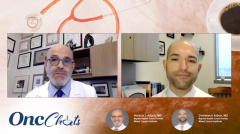
Mapping Progress in Pancreatic Cancer Surgery: Multidisciplinary Approach to Care
In this third episode of OncChats: Mapping Progress Made in Pancreatic Cancer Surgery, Horacio J. Asbun, MD, and Domenech Asbun, MD, underscore the need for utilizing a multidisciplinary approach to determine the optimal care plan for each patient with pancreatic cancer.
Episodes in this series

In this third episode of OncChats: Mapping Progress Made in Pancreatic Cancer Surgery, Horacio J. Asbun, MD, and Domenech Asbun, MD, both of Baptist Health South Florida, underscore the need for utilizing a multidisciplinary approach to determine the optimal care plan for each patient with pancreatic cancer.
DA: The other aspect that I think has become much more the standard of care, which is something we interact with on a weekly basis here at Miami Cancer Institute, is the multidisciplinary approach to patients [with cancer]. Treatment decisions are no longer made by a single person on an island; they are made by a team of experts. Can you talk to how that has affected patient care?
HA: Yes. We’re surgeons, right? We think we should be the ones deciding everything. Traditionally, [the decision of whether] a patient was going to have surgery or not had been [made by] the surgeon, because if you were not capable of deciding, you were [considered to be] “weak;” that [was] the perception. All of that has gone out the window. If you’re working at a true multidisciplinary integrated care facility that’s [caring for] patients with pancreatic cancer or liver cancer, all those [cases] have to be prospectively presented on tumor boards. Basically, now you have a second or third or fourth or fifth opinion regarding what a patient [will need] to have done, and those opinions are given by different specialists.
Now, there are plenty of places that say, “Yeah, we present patient [cases on] tumor boards [and we use a] multidisciplinary approach” because those are the catchphrases. But the reality is, you definitely have to [do this.] When you joined us, [Domenech,] you came from finishing your fellowship at Mayo Clinic, where I had spent 10 years, as you know very well. At facilities like Mayo Clinic [and] Miami Cancer Institute, [these] things are real; it’s integrated care under one roof. Here, we enjoy the presence of people who are world renowned and who have helped us. This is not [an attempt] to advertise; I’m trying to say that there’s no justification today, unless there’s an access issue, [for treating] those patients in an isolated manner. You need to make the decisions of when to operate or not to operate and [whether they should receive] neoadjuvant [treatment] first, with a group of colleagues that you respect. In that way, you can [ensure that you] offer the best option for [each] patient.
With molecular studies, this is going to become much, much more important, and we have seen that [with regard to] the cysts, [for example]. We know now that aspirating the fluid of some of these cysts [may be beneficial;] in the past, we would just blindly observe [these patients]. Now, with the molecular analysis, we can detect with a much better sense whether those cysts may eventually become [cancerous] and [accordingly,] we [can] act on them a little earlier. As more mutations are discovered, it’s going to be more and more important to delegate that part of input into the decision-making process to other colleagues because we cannot do it all.
DA: Right, absolutely.
Check back on Wednesday for the next episode in this series.









































